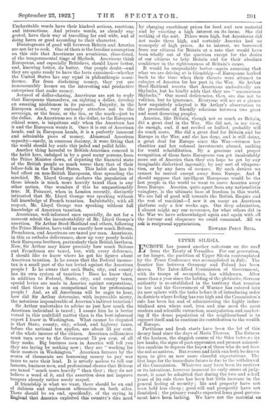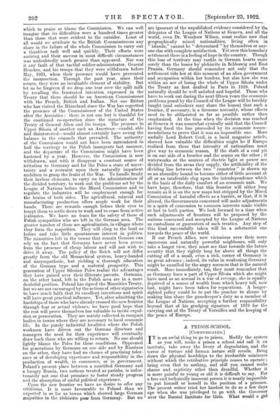UPPER SILESIA. E UROPE has passed another milestone on the road
from the Treaty of Versailles. For our generation, or for longer, the partition of Upper Silesia contemplated by the Peace Conference was accomplished in July. The frontier line between Germany and Poland has been drawn. The Inter-Allied Commission of Government, with its troops of occupation, has withdrawn. After more than a year since the holding of the plebiscite, German authority is re-established in the territory that remains to her and the Government of Warsaw has entered into its new sphere with the tasks before it of introducing order in districts where feeling has run high and the Commission's rule has been lax and of administering the highly indus- trialized area where coal, iron and zinc need the most modern and scientific extraction, manipulation and market- ing if the dense population of the neighbourhood is to support itself and to continue its contribution to the wealth of Europe. Partitions and fresh starts have been the lot of this dreary land since the days of Maria Theresa. The flatness of the horizon, the sluggish course of the Oder betwt ea its low banks, the signs of past oppression and present animosi- ties combine to depress the hopes of those who do not love the soil as natives. But reason and faith can both be drawn upon to give us now more cheerful expectations. The first hope for the immediate future is due to the withdrawal of the Commission. Whatever may have been its motives or its intentions, however innocent its early errors of judg- ment, it must be admitted that during the two and a-half years of its rule there has been but little increase in the general feeling of security ; life and property have not been held less cheap ; good will and prosperity have not flourished ; the primary results expected from good govern- ment have been lacking. We have not the material on which to praise or blame the Commission. We can well imagine that its difficulties were a hundred times greater than those that were evident to the outsider. Least of all would we attribute to the British Commissioners any share in the failure of the whole Commission to carry out a thankless task well and quickly. Their efforts were untiring and their success in most difficult circumstances was undoubtedly much greater than appeared. Nor was it any fault of that tactful soldier-administrator, General Heneker, and his troops that they were withdrawn before May, 1921, when their presence would have prevented the insurrection. Through the past year, since their return, they were an invaluable element of stability. But let us be forgiven if we drop one tear over the spilt milk by recalling the frustrated intention expressed in the Treaty that there should be an American Commissioner with the French, British and Italian. Not one Briton who has visited the Rhineland since the War has regretted the presence of the Commissioner of the United States after the Armistice : there is not one but is thankful for the continued co-operation since the signature of the Treaty of General Allen and his troops. The presence in Upper Silesia of another such an American—candid, able and disinterested—would almost certainly have swung the balance in the counsels that prevailed. The authority of the Commission would not have been surrendered in half the territoty to the Polish insurgents last summer, and the departure of the Commission might have been hastened by a year. However, the Commission is now withdrawn, and with it disappear a constant source of irritation to Germany and for the Poles a state of uncer- tainty and a restraint upon their naturally impatient ambition to grasp the fruits of the War. To handle firmly their lawless elements, to carry on the administration of the divided territory, to work out the problems set by the League of Nations before the Mixed Commission and to regulate the industries will be employment enough for the brains of both sides. The agricultural, mineral and manufacturing production offers ample work for their hands. There are rewards enough before their eyes to tempt them to settle down to work and to cease from active jealousies. We have no fears for the safety of those of Polish sympathies who are left in the German area. The greater number of these are agriculturists, in villages where they form the majorities. - They will cling to the land as before and take little spontaneous interest in politics.
The minorities left in the towns that remain German can rely on the fact that Germans have never been averse from the presence of cheap labour and will not wish to drive it away. The policy of the Reich will not differ greatly from the old Monarchical system, heavy-handed and unsympathetic, but yielding a thorough education of the German type and a material prosperity. This generation of Upper Silesian Poles realize the advantages they have gained over their illiterate parents. Germans, on the other hand, left in the Polish area are in a more doubtful position. Poland has signed the Minorities Treaty, but we are not encouraged by the actions of other signatories to have much faith that its excellent intentions and spirit will have great practical influence. Yet, after admitting the hardships of those who have already crossed the new frontier through fear or actual violence, we have good hope that the rest will prove themselves too valuable to invite expul- sion or persecution. They are mainly collected in compact bodies in towns where they are necessary to local economic life. In the purely industrial localities where the Polish workmen have driven out the German directors and managers the need for their experience will eventually draw back those who are willing to return. No one should lightly blame the Poles for these conditions. Oppressed for generations by Germans on one side and by Russians on the other, they have had no chance of practising toler- ance or of developing experience and responsibility in the production of wealth, in commerce, or in government. Poland's present place between a mortified Germany and hungry Russia, two nations treated as pariahs, is unfor- tunately not one that promises to foster steady progress and the absorption of useful political experience. Upon the new frontier we have no desire to offer any criticisms. It is more favourable to Poland than we expected in so far as towns which showed large German majorities in the nlebiscite pass from Germany.- But we are ignorant of the unpublished evidence considered by the delegates of the League of Nations at Geneva, and all the world, even Dr. Woodrow Wilson, must realize now that geographically mixed nationalities, living often in islands," cannot be " determined" by themselves or any- one else with complete satisfaction. Yet over this boundary settlement there is a feeling of hope in the country. Though this loss of territory may rankle in "German hearts more sorely than the losses by plebiscite in Schleswig and East Prussia, Germany should. remember not only that the settlement rids her at this moment of an alien government and occupation within her borders, but also how she was within an ace of losing the whole of Upper Silesia under the Treaty as first drafted in Paris in 1919. Poland naturally should be well satisfied and hopeful. Those who have to work out during the next fifteen years the economic problems posed by the Council of the League will be forcibly taught (and onlookers may share the lesson) that such a frontier, if necessary, is a tiresome necessity, whose effects need to be obliterated so far as possible rather than emphasized. At the time when the decision was reached at Geneva it was somewhat cynically said that the Council having fixed the line proceeded by its economic recom- mendations to prove that it was an impossible one. More usefully Lord Robert Cecil, in a lucid magazine article, showed how valuable the difficulties might be if Europe realized from them that intensity of nationalism must give way to economic reason. If the shaft of a coal pit is on one side of a frontier and the seams on the other ; if waterworks or the sources of electric light or power are divided from the areas they supply, the artificiality of the dividing line between the two " countries " is shown up as an absurdity bound to become either of little account at all or an intolerable clog upon the interdependence which is the basis of the daily comfort of an economic unit. We have hope, therefore, that this frontier will either long remain as it is on the new maps but stripped by the Mixed Commission of harmful effects as a barrier, or that, if it is altered, the Governments concerned will make adjustments in a spirit of concession to common interests made visible at last to both parties. We look forward to a time when such adjustments of frontiers will be proposed by the nations concerned and accepted by the League of Nations as custodians or guarantors of such treaties. Any step of this kind successfully taken will be a substantial one towards the peace of the world.
If our French Allies, now, victorious over their more numerous and naturally powerful neighbours, will only take a longer view, they must see that towards the future security that they rightly long for above all things the cutting off of a small, even a rich, corner of Germany is no great advance ; indeed, its value in weakening Germany might be annulled by the angry soreness that is the natural result. More immediately, too, they must remember that as Germany loses a part of Upper Silesia which she might have used as an arsenal in a war of revenge, she is equally deprived of a source of wealth from which heavy toll, now lost, might have been taken for reparations. A longer- sighted policy would be to put the poacher to shame by making him share the gamekeeper's duty as a member of the League of Nations, accepting a further responsibility beyond that of his grudging signature of 1919 for the carrying out of the Treaty of Versailles and the keeping of the peace of Europe.



































 Previous page
Previous page